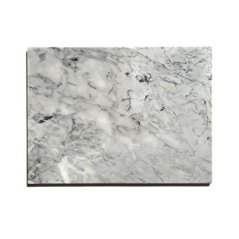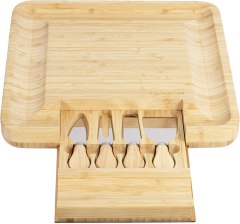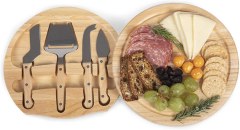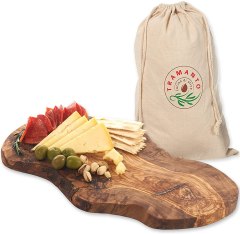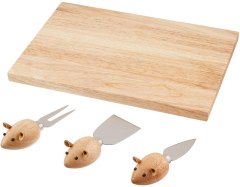Buying guide for Best cheese boards
When you’re making a list of your get-together essentials, keep one thing in mind: it’s not a party until somebody brings out the cheese board. It’s ideal for guests who like to nibble on appetizers or cheese aficionados with refined palates. Having the perfect platter for such exquisite food is important, which is why you should consider investing in a quality cheese board.
Cheese boards are generally slabs of wood, marble, or slate that serve as a smooth surface to host a variety of cheeses. In fact, to accommodate as many cheeses as possible, and space out and identify each type, the boards are usually the size of a serving tray. In fact, some cheese boards even come with labeling accessories. As the ultimate self-serving station at a party, some boards are equipped with a dedicated specialty knife set with a hidden compartment for storage.
Cheese boards are versatile and practical, and some are even conversation pieces.
Key considerations
Styles
Slab: The most common style of cheese board is the slab. Simply put, it’s a precut piece of wood or other material that is essentially a tabula rasa, so it’s up to you to arrange your cheese in a fancy way. Slab styles are typically round or rectangular, though it’s very common to see wooden boards in asymmetrical shapes. These one-of-a-kind pieces are ideal if you’re looking for a natural yet modern cheese board.
Handles: Some cheese boards are equipped with handles to make carrying and serving much easier. They can look just like the slab style yet feature knobs, handles, or raised edges for a better grip. These are very hit or miss when it comes to popularity, as some people find them incredibly practical, while others find the handles to be unnecessary.
Compartments: Because cheese boards often require knives and other serving accessories, there are some that come equipped with their own utensils and a special compartment to store them. The compartments have a precut slot for each piece so the utensils stay put when they’re not in use.
Expert Tip
You don’t have to put the whole block of cheese on the board. Depending on the number of people you’re serving, cut a hunk off and use that to start.
BestReviews Cooking and Baking Expert
Cheese labels
Some cheese boards, such as those made of slate, are meant to be written on with chalk. You simply write the name next to each cheese and wash off the chalk when you’re done. Other boards don’t have any way of writing directly on them, so you can use tiny signs on toothpicks that you can secure to each type of cheese.
The question is whether you should or shouldn’t label the cheese varieties on the board. Some cheese aficionados don’t need the assistance, as they can identify cheese on sight. Other partygoers might appreciate the heads up. If you’re serving unusual or very spicy cheese varieties, labeling can point guests to the cheese they like without any surprises. It’s entirely up to you as the party host, so choose a cheese board with the labeling style you think will best serve your guests.
Expert Tip
To avoid knife marks on your board, cut up all wedges of cheese so people can simply spear the cheese with a toothpick and serve it on their plates.
BestReviews Cooking and Baking Expert
Maintenance
Once the party is over, it’s time to clean your cheese board.
Wooden cheese boards can be cleaned with mild dish soap and water and should be thoroughly wiped dry. Leave the board standing upright to fully air-dry.
Marble and slate cheese boards can be cleaned with mild dish soap and water as well, though they require very gentle handling so they don’t break in your sink. Once you’re done washing your board, dry it with a lint-free towel before storing it.
Cheese board features
Materials
You might choose a cheese board based on the material. The most common are wood, marble, slate, and sometimes synthetic wood blends. Wood is definitely the most popular and iconic, and marble is a close second. Slate has risen in popularity with the recent chalkboard trend, and some consumers like the easy labeling feature.
As far as the hardware goes, expect stainless steel, quality metal, or matching wood elements. These handles or knobs are typically on par with cabinetry hardware.
Color
The color of a cheese board depends on the type of material, and you’ll find quite a bit of variety. Wooden boards run the spectrum from lighter colors like bamboo to darker ones like walnut. Marble cheese boards come in nearly any color and usually have a palette of two or three colors due to the patterns in the stone. Slate boards are either black or gray.
Utensils
As a knife set is essential to the true cheese board experience, some boards come packaged with a set of utensils. These board-and-knife sets are where you get the most bang for your buck because getting the knives separately can cost as much as another cheese board. The utensils do vary in quality, however. Some knives are all stainless steel, whereas others have handles and details that match the material of the cheese board, especially wood or marble styles. The more you spend on a cheese board knife set, the better quality it usually is.
Expert Tip
If you’re okay with people slicing cheese on your board, at least pre-slice a few pieces of cheese so they have social permission to slice their own. Sometimes guests don’t want to “ruin” the look of a perfectly intact board and hesitate to slice their own pieces.
BestReviews Cooking and Baking Expert
Cheese board prices
Most cheese boards cost between $20 and $60.
Inexpensive
At the low end, between $20 and $35, you’ll see mostly slab-style cheese boards that occasionally come with their own knives.
Mid-range
Cheese boards priced between $35 and $45 include styles with refined details and higher-quality materials. When they come with their own utensils, these are also of higher quality.
Expensive
High-end cheese boards that cost between $45 and $400 include premium brands of cookware and serving dishes. Many of these cheese boards include imported luxury materials, including ornate wood or marble. They look like cheese boards you might see in a nice restaurant or hotel, and some can be quite large.
Expert Tip
Edible flowers such as nasturtium and pansies make beautiful accents to your board.
BestReviews Cooking and Baking Expert
Tips
Create a special gift for the cheese aficionado. If you want to get an innovative gift your host will appreciate, a cheese board coupled with a unique cheese makes a practical and interesting present.
Keep the cheese board away from heat. Place your cheese board away from heated areas so it stays cooler longer and your cheese won’t get too warm.
Research wine and cheese pairing. Find out what wines will best complement your cheese selection. Encourage your guests to taste test and compare to find their favorite combinations.
Try different flavors. If you enjoy smoked cheeses, you can try making them at home with a smoke infuser.
Clean and store your board carefully. First, remove uneaten cheese and gently scrape off any that’s stuck on the surface. It should dislodge easily unless the cheese was blended with something like fruit or chocolate. Use a soft sponge and mild dish soap to clean the board and a soft towel to dry it. Abrasive scrubbers and rough paper towels could damage the surface. Store it in a dry, dust-free area so the surface stays intact and clean for your next gathering.
Expert TIp
Serve your cheeses at room temperature for the best flavor.
BestReviews Cooking and Baking Expert
FAQ
Q. Can I put other items on my cheese board like fruit or cold cuts?
A. You can, depending on the material. Some cheese boards are designed to be multi-purpose surfaces, but some materials are more porous than others. If you’re concerned about maintaining the integrity of your board and avoiding contamination, opt for marble or slate instead of wood.
Q. Will using knives on my cheese board damage the surface?
A. Any time a sharp object comes in contact with a surface there’s a risk of damage. Dedicated cheese board knives are often designed to inflict minimal damage, if any. Some cheeses are harder to cut than others, so to avoid unnecessary nicks or cuts to the cheese board surface, you might want to slice these varieties on a cutting board before serving.
Q. My party is going to be larger than expected, so will my cheese board be enough?
A. If you’re already wondering whether you’ll have enough cheese, it’s time to buy more. With that said, if your guest list is growing, you might want to invest in a second cheese board. While you might not need to buy twice as much cheese, or even put the same varieties on each board, placing the boards in different parts of the room is a good idea. Guests can mingle instead of waiting in line for the cheese board.


